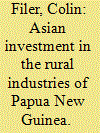| Srl | Item |
| 1 |
ID:
120196


|
|
|
|
|
| Publication |
2013.
|
| Summary/Abstract |
One part of the Australian colonial legacy in PNG is the Australian government's attempt to forge partnerships with different groups of foreign companies in different economic sectors in order to lay the economic foundations for rural development in the newly independent nation. American and Australian capital was invited to develop the mining industry, European capital to develop the oil palm industry, and Japanese capital to develop the forest industry. Nowadays, the Australian government seems to have forgotten its late colonial enthusiasm for this form of state capitalism, and its aid to PNG is largely framed by the neo-liberal policy prescriptions which the World Bank was able to impose on the PNG government through a sequence of structural adjustment programs beginning in 1990. However, members of PNG's national political elite have persistently sought refuge from this economic orthodoxy through their engagement with Asian governments and companies. In this paper I examine the way in which changing political and economic conditions have affected the actual pattern of Asian investment in PNG's forestry and agriculture sectors, and the way in which different stakeholders have responded to this changing pattern of investment. Despite the prevalence of a policy narrative which holds Asian investors responsible for the corruption of PNG's political institutions when mineral resource booms liberate national politicians from the constraints of Western economic orthodoxy, I show that Asian investment in these two sectors has taken several different forms, and there is no simple sense in which PNG's national economy and political system are subject to a concerted takeover by Asian business interests.
|
|
|
|
|
|
|
|
|
|
|
|
|
|
|
|
| 2 |
ID:
178283


|
|
|
|
|
| Summary/Abstract |
Papua New Guinea’s first deep-sea mining project, once touted as the first of its kind in the world, now appears to be “dead in the water.” The mining company behind it has been liquidated, the mining equipment has been rendered obsolete, and the host government has been made to look foolish for supporting the enterprise. This paper examines the application of two concepts—that of the “resource frontier” and that of the “actor-network”—to reach an understanding of the history of this apparent failure. By elaborating on the additional concept of a “network junction,” it seeks to show how arguments about the feasibility or fallibility of this particular project, and deep-sea mining proposals more broadly, have been related to arguments about a range of other issues in which scientific and technological uncertainties are associated with environmental and social impacts or environmental and political risks. Instead of seeking to explain the failure of this project by reference to the attributes of a specific type of maritime resource frontier, the paper shows how the articulation of different policy networks creates the appearance of a frontier in which human and non-human actors have combined to produce a variety of unpredictable and open-ended outcomes. From this point of view, the history of this project’s failure cannot simply be read as the outcome of a contest between two groups of human actors with clearly defined interests or ideologies, nor does it necessarily spell the end of the policy network in which this project has been embedded.
|
|
|
|
|
|
|
|
|
|
|
|
|
|
|
|